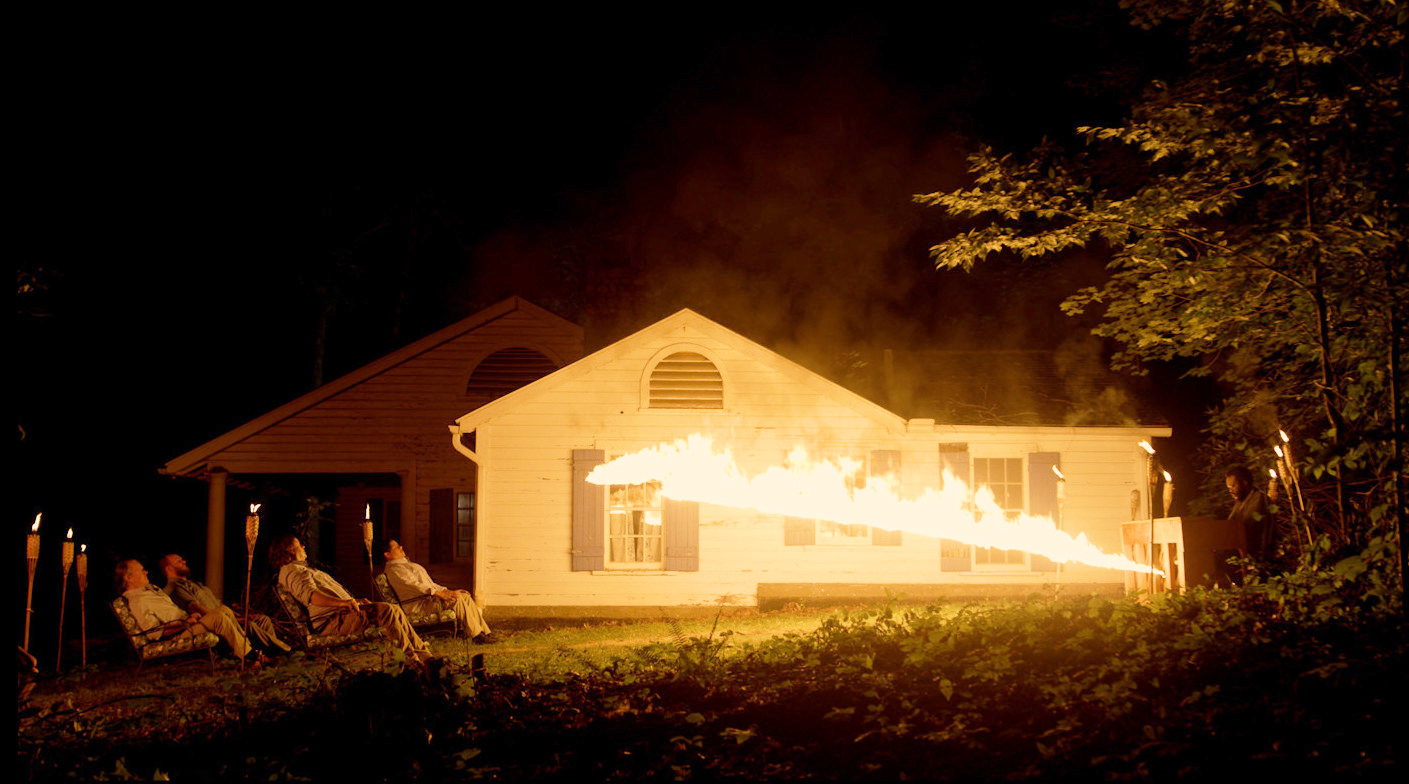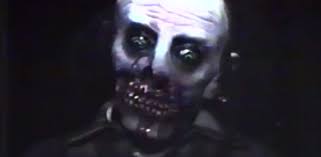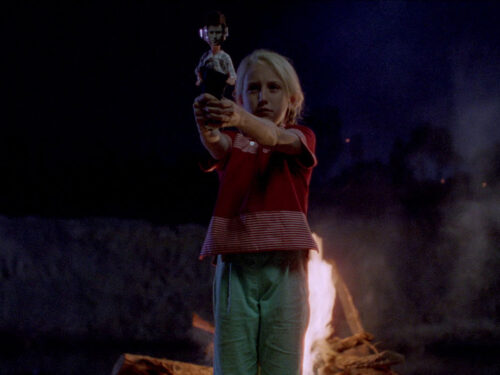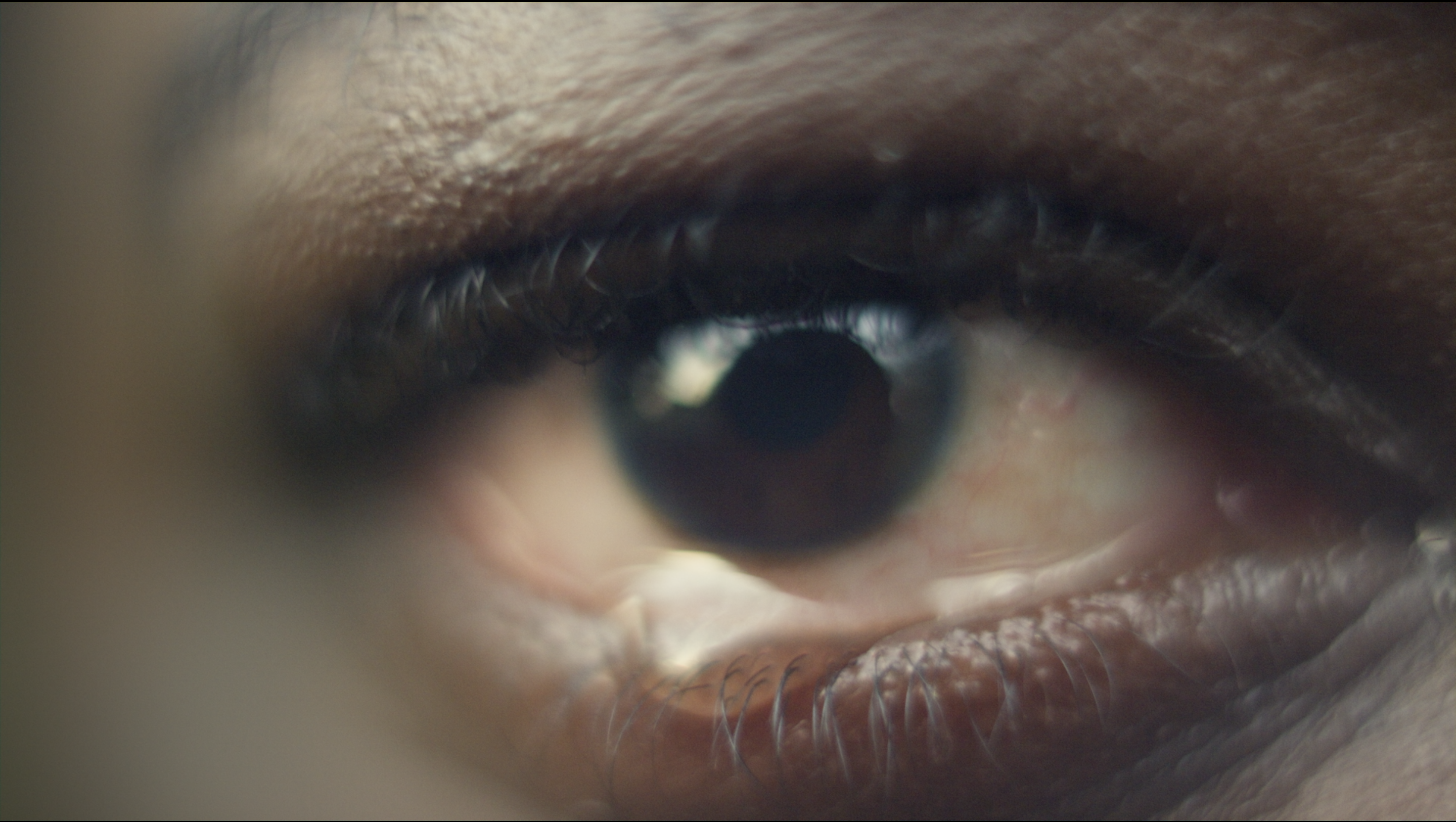With Sentimental Value having its digital premiere here on Split Tooth, we spoke with writer-director Collins about his latest short and his life in film
Steve Collins has long been a favorite here at Split Tooth. When we published Brett Wright’s essay on Collins’ first feature, 2006’s Gretchen, we never expected that he would soon be writing essays for the site and hopping on episodes of the Split Picks podcast.
For our site’s fifth anniversary, we are honored to host the online premiere of Collins’ latest short film, Sentimental Value. Starring many of his most frequent collaborators — including Randy E. Aguebor, Paul Gordon, John Merriman, and Byron Brown — the film finds a group of coworkers joining together to help a friend (Aguebor) in need. They purchase a second hand piano at a yard sale and watch as their gesture reignites — quite literally — their friend’s spirit.
To accompany the premiere, filmmaker and Cinesthesia Podcast co-host Jim Hickcox spoke with Collins about the new film and his journey in filmmaking. Their discussion covers not only Collins’ unique style and approach to making movies, but also broader issues of independent production and how to sustain and develop a life as an artist.
Jim Hickcox: Do you feel like you have a generalized descriptor of your oeuvre, your “brand?”
Steve Collins: I do what I call gray comedy. I’m very sincerely interested in the emotions behind my characters and their struggles. I take those very seriously, but I’m also very committed to finding a way to create humor out of it, as a kind of therapeutic process. Not all of my stuff has been comedy, but even in my dramatic stuff, I try to find the lightness and the beauty in it. I see comedy as beauty, so if in the dramas I’m not doing pratfall stuff, I’m trying to find some other source of beauty to balance out the pain. In general, I’m trying to find how people hurt and how they get better. I’m also interested in cinema itself, so I like to play and use color, editing, and sound to get my meaning across, and so a lot of my stuff tends to be a little lighter on the dialogue and realism.

Right now in comedy — and I blame this on the guy that made Freaks and Geeks and Will Ferrell — most comedy is a bunch of people getting on set and just saying things they think are funny to each other. I appreciate that you spend a lot of time thinking about visual bits and taking aesthetic considerations into your work.
I feel the same about modern comedy, which fuels me to think that I can add something. I think a lot of the modern comedy directors come out of sketch comedy so they are very good at knowing what’s funny. And they are funny and are good at choosing great comic actors. But they are not grounded in filmmaking. That’s something they picked up and acquired along the way or are leaning on their other collaborators for. It’s not necessarily their passion or what drew them to entertainment. Getting comedy on film is really challenging, especially when blending it with emotion. In modern comedies, I notice a lot of them have trouble with the emotional parts or the serious parts of the movies because it’s very tough to sustain a film with sheer laughs for 90 minutes. That’s the hard part: moving from comedy to feeling. So when they have the part where the character is supposed to be transforming, it rarely feels genuine. You need to study film and how it works to guide the audience through those processes. Stuff like Sentimental Value is me practicing that.
Sentimental Value is a very earnest film. Your work tends to exist in heightened realities, sometimes almost absurdist, but still seems to maintain a level of sincerity. Do you struggle balancing those?
That’s my interest. I like things that are absurd and weird, but I think of weird as discovery, something new. It’s something you’ve never seen and that’s beautiful. But if it doesn’t come around and mean something for the characters or the world I’m trying to create, then I consider it indulgent, because it’s not useful in helping us figure ourselves out. So I always try to, no matter how strange the world I am working in is — and, especially in films like I’ve Got Issues, we get into some really strange, almost grotesque absurdism, with a guy melting into his lounger — but I always try to take it to someplace real and sincere for an audience to relate to. That’s maybe asking a lot, but that’s the fun of it, taking something that you could just make grotesque and take it to someplace honest.
But ever since I started making films, I’ve seen some of the blowback against the sincerity and the earnestness because I think in the “art world” it’s not always the trendiest thing to be earnest. But you have to follow what you actually feel in your gut and there isn’t much you can actually do about that.

This is half of two questions: but it feels like a lot of your work is dealing with the doldrums of humanity. We see a lot of people in understandable, but banal, situations. You have office workers, people in school, and I see those people all wearing the same khakis and I get it. But Sentimental Value deals specifically with the creation of art in a way that I haven’t seen you approach in other things.
It’s something I have been focusing on recently. I’m a teacher and as I got to my midlife — I’m 48 now — I started getting reflective about being an artist and how odd and frustrating it is. I started doing a lot of research and watching films about artists. I watched a couple hundred of them and out of that, having my head filled with different ideas and images, I was trying to process being an artist. You get to this age and you start thinking, ‘Well, I don’t have that much time left… Why am I doing this? Did I do it the right way? It’s not exactly how I thought it would be. Is it still what I want?’ Out of that, my interest grew in focusing my work on artists and their troubles. Around this time we made I’ve Got Issues, where I was able to bring together a bunch of my weird actors and I was able to have them all and pay them and we got to go on this retreat and work together for a month or two. But then that ended. And whenever you have a sort of big project and it ends, you have a bit of a comedown when you land. Everyone goes their separate ways and you’re no longer a superhero who can do big things and say, ‘Move that stuff!’ It’s a comedown for everyone, not just the director but for the actors. You’re making something that’s not only an expression of yourself, but you’re involving these other people who are able to express themselves. It’s a feeling of deep, creative community that I don’t have when I’m not making things.
Out of that, there is a loss or mourning that happens. I was watching something that Randy Aguebor posted on Facebook. It was just him with a thousand-yard stare and I kinda knew he wasn’t in a great place; it felt like kind of a cry for help post. And I identified with that feeling of being stuck. You know, he’s been working as an actor, done a lot of good things and been working on TV, been in a feature, but he was stuck again and broke. It really moved me. So I wrote Sentimental Value about a depressed artist whose friends come and offer this piano to him to pull him out of it. Then I got excited with the idea of going inside a piano and seeing what’s really wrong with this pianist in a more abstract way. And that’s what I don’t know… I don’t even know if it works. It moves me when I see it, but I am asking the audience to go into a level of abstraction that they might not be comfortable with if they need more of a literal explanation for what’s going on inside that piano with a bunch of guys with harpoons hunting him [laughs]. When you can’t create, there is a pain to that that I wanted to get across. Most people who make things, or want to, do things passionately or powerfully; when you can’t do that there is a real pain. This guy is really hurting because he is stuck and can’t do what he was put on this Earth to do. I wanted to show him pull himself out of that and make something and have it be quite stunning. That’s what I hope comes across.
For what it’s worth, as a filmmaker who hasn’t made a film in three or four years, I felt that. And I feel that transcendence, or to be as vulgar as possible, that flame ejaculation that comes out of the piano when you are affecting things.
Yes, it really feels like you are really releasing the spirit inside you. It’s why you want it so bad again when you are done. It’s really intoxicating. It’s the feeling of being alive! You don’t have that every day and it can give you these ups and downs, real highs and real lows. That’s what I saw in that Facebook video. I saw what Randy was going through and I knew that low.
A lot of my stuff has sort of Sesame Street values, with friends helping each other, but you know…
That’s kind of all there is, on some level.
I know! On some level, it’s like, what else is there beyond being kind to each other and helping each other and not thinking only of yourself? It’s very Sesame Street but it’s been very important for me in my life because these movies have become a big part of my life and these friendships that I have created with people like Randy.

You have a repertory cast, a strong core of people who come out pretty regularly for you.
That was the biggest thing I got out of going to UT Austin, all the people I started working with: John Merriman, Courtney Davis, Paul Gordon — Courtney and Paul were in the grad program with me. One of my first students when I started teaching was Craig Elrod (Mustang Island), who introduced me to some other collaborators like Byron Brown and my DP Nathan Smith. John introduced me to Sam Eidson who is another extremely talented actor. I met Macon Blair at SXSW when we were touring with short films. He moved to Austin just as I was leaving. I love all these people very much.
As I’m sure you know from doing low-budget stuff, you better have them be your friends because there’s no pay day coming. Maybe everyone hopes this will lead to something else, but everyone has to know that they are going to come and enjoy themselves and it’s going to feel like living; like they are being their best selves. There’s a kind of trust going on between us all and a love that we have for each other.
Whenever I visit Austin, I feel more like myself and at home. I had a version of myself that would’ve stayed there to make things, but I couldn’t make it happen economically. I don’t know if it’s changed, but when I was there, there really wasn’t much of a film industry, it was more hobby based. I tell my students that you really have to be entrepreneurial if you want to make films.
The business side of making films is something that I am not good at. And to do that part of it takes a lot of emotional capital out of me, and if I’m not getting any emotional rewards out of it, I would fear what it would do to me. I’ve been making films commercially since I was 30 and I’m losing money on every one of them. It’s hard to figure out how to keep doing it when it feels financially irresponsible. I don’t know whether you’re supposed to say, ‘That’s art, who cares?’ or whether you’re supposed to beat your head and find some venue that might pay for it. But with something like Sentimental Value, where would this show?
Yeah, where is the home for this?
Yeah, and yet, it’s very personal, and I needed to make it. I just worry that it’s too inside or only works for a small group of people. And it’s a short that I haven’t played for a lot of people. It’s going to screen at a couple places, like we are going to show it at Mammoth Lake Film Festival and Calgary Underground.
Those are fun festivals.
Yeah, and they are discovery festivals so they program whatever they want. They aren’t worried about whatever the other ones are worried about. So we will see. I’m interested to see if it plays with an audience. Because it’s all these guys in matching khakis and all work in the same place, and there’s a certain kind of rational audience member who wants to know, ‘wait, are we going to go to Compu-City?”’
‘Tell me more about Compu-City!’ [Laughs]
It’s just a shorthand for saying they live in a world where they don’t express themselves as artists. They all know each other from work as clerks. I’m interested in seeing if people will respond to the push into the inside of the piano and if they feel bogged down looking for symbolism in the abstraction. I wanted the going inside the piano to be emotional and not something you have to spend too much time interpreting. I can do it myself, because I’ve had dreams like that — getting harpooned and impaled — and I know it’s about the struggle inside, the inability to create, what that does to you. So for me, I see this dream on screen, and I just go with it. It can be hard to separate yourself from your film to make things accessible for audiences, especially because it’s so visceral to me. I hope it will be for them, but it’s a bit of an experiment.
I don’t mean to comfort you, but, it didn’t feel like I had to work at all.
I’m not throwing up images of skulls and crosses and saying, ‘Now, you figure it out!’
Right. It’s like, when I watch my students watching Kenneth Anger and some are like, ‘Why did any of this happen?’ I tell them, ‘Just feel it. Don’t think about the Nazi images. Just coast across it and think about what your heart says.’
[Laughs] Good answer!They don’t like it. They don’t like that stuff… You mentioned that you are now in Connecticut. With your crew of Austin’s finest in Sentimental Value, are you flying them all out to you?
Yeah, we are importing everyone. They all stay at the house, so lodging is OK. But it’s really hard flying people out and feeding everybody on a small budget. I had my kids helping with the sets and a friend helped with construction. We do it summer camp style. We have fun, but it can be a little stressful. And this project had a lot of experimentation, like filming underwater. We kind of underestimated it — like every filmmaker who has ever filmed underwater can tell you, this is not something you really want to do. We had a hard time in that swimming pool. It was kind of a Hearts of Darkness moment. It was a night shoot and we started hearing the birds come out, tweeting, and we had nothing shot yet. We had so many problems with the camera and with the wet bag, and there was some particulate in the water that was screwing up our shot. The underwater lights were fritzing out. Being dumb people, we also underestimated how hard it would be to sink something made out of wood [laughs]. We fell so behind and then you have the rental equipment that has to go back… But we powered through and got just what we needed and nothing more. For me, it felt miraculous that it cut together into anything.
I make these shorts in a way that I would never recommend for my students. I don’t have an assistant director. I don’t have a producer. Having a producer would mean flying someone else out and feeding that person for four days and all that. The weight all lands on me and it can affect the work. There were a couple things on Sentimental Value, that I don’t even want to talk about, that I screwed up because I was overwhelmed.
As I tell my students, you have to storyboard and plan because you get into these situations where you need to know what you need in order to cut something together — the bare minimum. Sentimental Value really was much more of a student way of doing things. I haven’t shot that desperately since I was an undergrad. Some sloppy stuff happened and I found myself stretched because I was trying to do things I didn’t know how to do. ‘How do you get fire to shoot out of a piano?’ ‘How do you shoot underwater on a budget on color reversal film?’ [Director of photography] Nathan Smith and I really hit rock bottom doing the underwater shoot. We thought we had lost, but watching how it cut together was like, ‘Oh, I guess we won.’ We now want to get back in the water for some redemption to use what we learned to do it again.
Related: Read about Steve Collins’ Gretchen (2006):
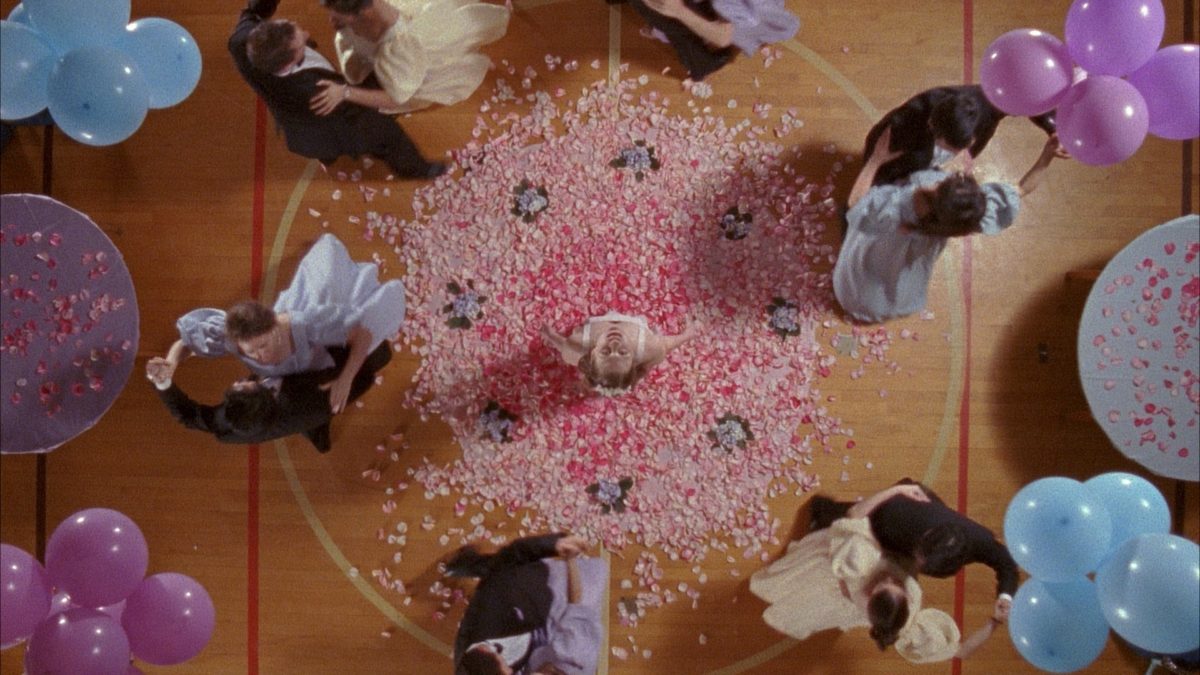
Your fire was practical also, wasn’t it?
Yeah, and that takes a lot of planning. You don’t want to burn your actors. [Laughs] I bought a flamethrower online, because this is America [laughs], and then we just had to figure out how to get it into the piano. I didn’t really understand how a piano works and the part where we made the flame come out of is the part where all the wires are and the mallets hit. We had to destroy the piano and cut all the wires.
The night we shot, the flamethrower stopped working. Mostly because I had been playing with it.
Sure, why wouldn’t you?
I mean, you only have a flamethrower for so many hours of your life and it’s really fun to use. It makes you feel very powerful! [Laughs] My friend Dan was able to fix it, but we had to disable the safety, so as soon as you turned it on, it would just start spitting fire. So I looked at him and asked if we could do it safely. He said, ‘Yeah, but let’s just do it once.’ So, we had measured, and it shoots fire 35 feet and not an inch more. We tested it again and it still went 35 feet. So we had the actors and they were all fine. John Merriman was a little nervous, but was a trooper, Sam Eidson didn’t bat an eyelid. We shot it so you can’t quite see the depth and blocked them so it looks like it is getting closer to them than it actually is.
We thought about compositing it digitally and all of that, but we ended up going for it.
That is the right choice.
But that’s the other thing, we didn’t have the budget for a digital compositor. It also would’ve been more complicated to composite with the lighting. So I sat there with the camera and had my DP fire it at me. So I thought, if I can do it, the actors can do it. And we had fire extinguishers and fire blankets. For one of the other shots where the fire is coming right at the camera, we did end up setting a tent on fire and had to use our extinguishers. It was like little boys playing with fire, but nothing was really dangerous. And even before the shot when the tent caught on fire, we looked at each other and were like, ‘this is probably going to catch the tent on fire.’ [Laughs] ‘Yeah, well, OK. If it does, we use the fire extinguisher.’ Have you ever used a fire extinguisher? It’s kind of fun.
Yeah, it is fun.
As long as no one is on fire, it’s fun. It was a real mess and it ended up on a rented dolly. It was a real problem. I didn’t know they were so messy.
They are super messy. I learned that on a film set when I made people fire one off inside a building.
It’s hard to clean. And we got charged for cleaning —
But you didn’t get charged for arson, so that’s a good thing!
When this shoot was done, I slept for two hours and then I did the returns. Remember that from when you’re a student? So I drove to New York or Queens, which is like two hours for the returns.
The film works, but it did make me question if I could do things at this level of complexity. A lot of the shorts I’ve done have just been me and the DP. Very simple. And I wanted to push it, but then I started thinking I should either go back to simple or find a way for someone else to pay for this so we could have a producer.

Having watched several of your films, your voice fits naturally within the aesthetics of the budget range. Do you think it is sort of natural for you to work within that budget range or are you having to fight against instincts to —
— to make Star Wars? I mean, I would not want to make big huge things. I am interested in burrowing and getting to the marrow of things. And the reason I was able to do a couple shorts that were just people talking in a doorway was because it was still interesting to me even though, visually, it was just over-the-shoulder shots in a doorway. I want to find the heart of what’s wrong. Finding an existential crisis in a plumbing problem; those mundane tasks that you sometimes have epiphanies in the middle of. You don’t stop living and feeling just because you are shopping or raking the lawn. You’re still yourself and going through all your worries and neuroses. And I think it would certainly be harder if I was a Terry Gilliam-type who wanted to make these intricate worlds, or a George Lucas. If that was me as a filmmaker, it would be a lot harder for me to work at the budgets I am able, or have chosen, to work at.
If someone came to you and said, ‘I want you to make a $25 million movie.’ Would you say, ‘No, I’d rather have $3 million?’
I think I would rather have four. [Laughs] Enough that everyone can be paid properly, have all the positions you need filled, and be able to film underwater and do something visually extravagant. But the need to make films outweighs everything. At 48, I have to prioritize getting things done.
When I’m working with my students, they really think that independent film means independent. But unless the director is funding it, it’s not actually independent. The money is always in charge or at least has a huge say. And some of it isn’t to the detriment of the project. When there’s pressure on a movie to perform, it can help you make some difficult choices that are often necessary. I’ve certainly had to make hard cuts to my movies, like I’ve Got Issues and Gretchen, and all my films. And they were all independent films, but that’s what you have a producer for. They aren’t there to just blindly support you but to keep you from indulging yourself right off a cliff.

You have a consistent squad that you make your films with. Of all of them, John Merriman seems to be the one you go back the furthest with. How long have you known John?
John and I met in, I think, 1999. Courtney Davis, too. We started making things that year. And that was really important for me. I found people who had the same sense of humor and who wanted to make things. Finding those people is really important. It’s a lot of work making things. It’s not goofing around, so you need people who are going to get things out of it rather than just feel like they are doing you a favor. We all feel really blessed when we can make things together. When we made I’ve Got Issues, we were all pinching ourselves because we had the chance to do this together again. On a few other projects that didn’t happen, I did the thing where I sent it out to “names,” but the problem is, when you are on a low budget, if you don’t have the money yet and you are trying to get a name attached… like, does that ever work? I’ve got some people who you’ve heard of to be “interested,” but unless you have the money first, it’s hard to draw them in.
All the parts have always been so particular and written for my people. I grew up really loving John Waters and that world, and I sort of ended up in that situation where my stuff is so weird that I need my people to do it. I always admired Waters’ creativity in his casting, as he got bigger. Casting outside of the box with Debbie Harry, or Iggy Pop, or Kathleen Turner in Serial Mom. But with my projects, we’ve never had the right role or the money all ready. My projects have always come together by assuming we wouldn’t get the name people, so I write them for my people and the ball gets rolling and you just go. Because why would you stop it rolling? But I would love to work with other people. Every time I work with someone new and it works, it’s rejuvenating.
Above: Steve Collins with Courtney Davis, Macon Blair, and John Merriman on the set of Gretchen (2006). (Courtesy of Steve Collins)
Working with the same people for almost 25 years, and your work is so idiosyncratic, does it feel like you and these actors have matured similarly and your tastes have developed similarly? Has time shifted those relationships?
In some parts of I’ve Got Issues, we all felt quite young. It felt like we were in our 20s again, so much so I was a little worried that we had made a little movie just for us. I was worried I had committed the ultimate sin of indulgence. But there’s a lot of spiritual searching in that film and all of the actors understand that it’s not just kitschy new age stuff, and they can relate to it, because they’re all older and have had some hardship. Gretchen, our first feature, had 30-year-olds playing teenagers. There is a level of irony there. But by the time we got to our second feature, You Hurt My Feelings, there was no irony. It was about a guy dealing with depression in the aftermath of some kind of horrible breakup. Merriman plays a nanny who has bottomed out and is trying to get his girlfriend back. He tries to model being an adult with these two small children who aren’t his.1 It was a process of our own growing up and putting it on film. There’s a character who is living sort of fast and wild and he dies, and that was something that we’d all seen happen or worried would happen. Having gone through all that life together with John and then making something like Sentimental Value where he has a smaller role — he’s carrying a lot of history with me and our work, and you can see the depth in that even if you haven’t seen the other films. For Sentimental Value, John has one big moment in the film, and he knows exactly what he needs to do. The script says he is “deeply moved” and he delivers.
He does really shine in that one moment. It’s really special.
He knows what I want and that I am serious. I don’t have to tell him to think about his dead grandmother or anything. And that is maturity and growing up and working together. John knows that we are all really serious about this and it is an honor to be able to do the work. Having done these films and then having the years apart between projects, you know how valuable it is. So you know how to concentrate it and bring your all.
If you watch from the beginning, the films have deepened. It’s hard not to mature as you go through life. I used to think that heroes were only soldier types who volunteered for danger. In the movies they come back and they are like, ‘I’m not a hero. I was just trying to survive.’ I now kinda feel that about everyone once you pass a certain age. [Laughs] Because you can’t avoid tragedy and you have to deal with it the best you can. After a while, people you know start dying, your heart gets broken a bunch of times, nothing works out, and you’re that heroic person saying they’re not a hero — you’re like, ‘I’m just still alive. I dealt with all these things that I didn’t want to deal with and I didn’t ask for them. If there was an option to avoid them, I would have.’ But you can’t, so by the time you get to 50, I think everyone is some kind of a hero, as long as you’ve retained some form of integrity. We lose our friends, our parents, our mentors. It happens to everybody. If you survive and do so with a modicum of integrity and an attempt to maybe try to make the world better consistently, I think you’re a hero.
Stay up to date with all things Split Tooth Media and follow Jim on Twitter
(Split Tooth may earn a commission from purchases made through affiliate links on our site.)
- Editor’s Note: The kids are played by Collins’ two daughters, Lily and Violet, who nearly steal the entire movie, and are also the stars of Collins’ 2017 film The Secret Life of Girls, which is available to stream here.

